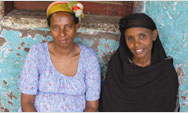
Photo: David MacAfee
Safe water treatment available in a rural village in Madagascar.
428,524 bottles of Sur’Eau were sold - enough to treat over 210 million gallons of water.
|
Initiative
USAID in Madagascar promotes safe water treatment as a simple, inexpensive, and effective water quality intervention. A “social marketing” approach combines education to motivate healthy behavior with the sales of needed health products and services for poor families, using private sector distribution networks and marketing tools.
USAID recruited small restaurants in urban areas to use water treated with a disinfectant solution called Sur’Eau for their clients’ drinking water, to prepare food, and to wash vegetables, dishes, and hands. The restaurants pay a small fee in return for a 120-liter barrel, free radio publicity, and interior and exterior signs. In 2003, access was expanded by establishing 214 new wholesale
|
|
and 1,674 retail outlets which sold 428,524 bottles of Sur’Eau. To increase health and hygiene awareness as well as demand, both outreach and information sessions were conducted that included 209 mobile cinema projections reaching 194,000 people, 5,846 radio health promotion spots, 5,325 education spots, and 1,039 television spots.
Results
Social marketing of safe water treatment addresses a fundamental equity issue — access to clean water — by increasing the information and products available to low-income families. Affordable safe water treatment especially benefits those who live in high-contamination conditions — such as overcrowded urban areas underserved by the current infrastructure. The affordable solution to safe water treatment is a thirty cent bottle of disinfectant that protects a family of six for a month. The Sur’Eau safe water treatment in Madagascar is also produced locally which supports the local commercial sector. Home water treatment leads to substantial reduction in diarrhea, greatly improving children’s health, nutrition, growth and development, and the potential for dramatically reducing childhood deaths.
Print-friendly version of this page (257kb - PDF)
|
|


